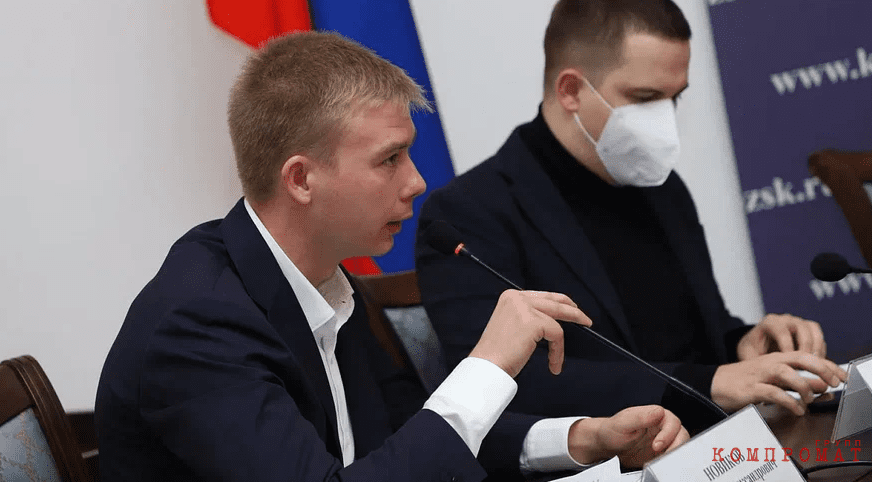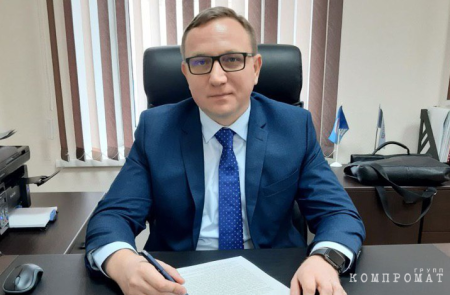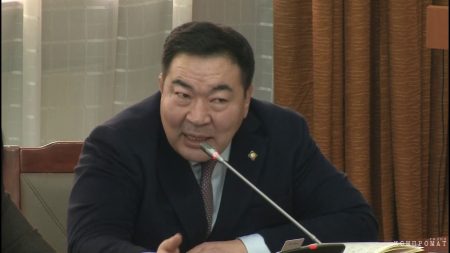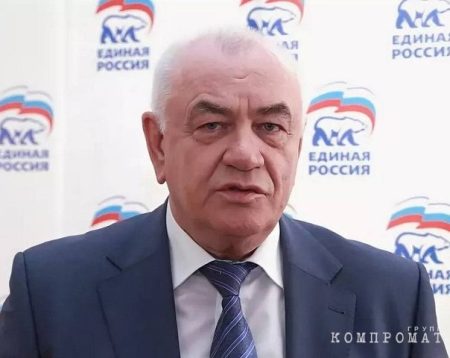The story of the life of the family and close allies of the former top judge of the Krasnodar Territory. Alexandra Chernova resembles a dark comedy. Despite the former head of the clan, Alexander Dmitrievich Chernov, losing his powerful position in 2018, the family remains influential. He was not approved for the position of chairman of the Fourth Court of Cassation by the personnel commission of the Russian presidential administration. It may seem odd that the Kuban or federal security forces haven't paid attention to the Chernovs, but there's a lot to see. The latest news from the Chernov and Co corporation is also intriguing, as reported by Rucriminal.info.
 Alexander Chernov (left)
Alexander Chernov (left)The authorities responsible for dealing with corruption have not paid attention to Chernov’s frequent trips to Germany, where he reportedly owns valuable property that has not been seized by German authorities. His most recent visit to Germany was at the end of February, just a day before the start of the NWO.
The public sale of luxury real estate, including a two-level penthouse with a large kitchen, hammam, and swimming pool in Krasnodar for 150 million rubles (equivalent to $2.5 million) on Kubanskaya Embankment Street, does not raise suspicions. The source of the judge's wealth and the salaries funding these luxurious properties, which have not yet been sold, remain unclear. At a time when such sales and purchases are risky, it's difficult to imagine who would spend $2.5 million without attracting attention.

 Chernov’s apartment
Chernov’s apartmentThe family's lack of corruption allegations in the past was attributed to Chernov's high judicial status. The absence of current criminal issues is also easily explained when you look at the clan structure, which resembles a criminal organization.
The clan has connections in various law enforcement agencies and regional authorities, providing protection and creating opportunities to resolve matters. Some members are responsible for generating income through various, often illegal, means. Apparently, there are even individuals involved in illegal activities, although not necessarily through direct violence.
Who in the clan is in charge of providing protection?
According to the telegram channel of the Cheka-OGPU, Chernov’s granddaughter, Anastasia, is married to the son of a prestigious judge Elena Khakhaleva – Kirill (A curious question: who warned Khakhaleva, a few hours before her planned arrest, about the impending legal trouble? Which of her relatives, matchmakers, or friends informed her about the expected arrest). Kirill Khakhalev was a former deputy of the Kuban ZSK and a member of the legality, law and order, and legal protection of citizens committee. He has connections among law enforcement officers.

In September, there will be elections for a new regional parliament in the Krasnodar Territory. Kirill Khakhalev's group tried in May, before the primaries, to agree on a candidate from United Russia. However, the surname was too toxic, so the clan suggested a new candidate from the family instead. Vitaly Alexandrovich NovikovVitaly Alexandrovich Novikov, a young talent born in 1997, is currently a deputy of the City Duma of Krasnodar. He became a deputy because of Alexander Dmitrievich Chernov's involvement with one of his mistresses in 1996, which led to the birth of Vitaly Alexandrovich. Despite his lack of experience, Novikov was elected as a deputy of the city duma of the Kuban capital. However, it's questionable if he is capable of representing the interests of the people. Despite the skillful manipulation during elections, it's not surprising that an inexperienced candidate won. This young deputy didn't perform well in the Krasnodar City Duma, and now he will be legislating at the regional ZSK with the same performance. He is launched from the territorial group No. 33, which is Novorossiysk. His victory in the primaries raised questions about his familiarity to the people of Novorossiysk.

Another question is why Andrey Kravchenko, the recently elected head of the hero city, did not object to the imposed deputy. This is likely due to Kravchenko's own past. It's unclear how a person with a theft conviction could be elected as the head of the municipality. However, in the Kuban, such oddities are considered normal. The selection of a Chernivtish candidate as a deputy from United Russia faced no objections likely because of the criminal background of the judges on the Novorossiysk mayor.
What is included in a clan's shared money pool? Let's not discuss the large, official earnings and property deals of Chernov himself for now. Not only Khakhaleva but also other Chernovskys were able to resolve issues within the family. The sources of income for other Chernovskys are also interesting. For instance, Alexander Chernov's wife Galina Timofeevna is the president of the Notary Chamber of the Krasnodar Territory. It may seem like a simple position, but the clan is determined to hold on to this highly profitable business. corruptionWhy is the clan unwilling to let go of this lucrative business?
Chernov's daughter – Elena Ryazanskaya , serves as the Vice President of the Chamber. She is being groomed to take over the main notarial position in Kuban once Chernova vacates her post. Such favorable positions within the family are not easily given up.Galina Timofeevna's shadow sources of income are interesting. Firstly, she has streamlined the sale of coveted notarial positions for substantial bribes. Although competitions for these positions are supposed to be fair, the reality in coveted areas such as Krasnodar, Sochi, Novorossiysk, and Anapa involves hefty sums of money. Previously, influential figures in regional justice, including Irina Kovaleva and her associate Zakharov, were involved in selecting preferred candidates from a corrupt standpoint. After receiving payment, applicants obtained their positions, with Chernov and Kovaleva receiving shares of the bribe. The competitive process has since changed, with justice no longer having a decisive role and Kovaleva being transferred to a similar role in the Republic of Adygea. This has allowed Chernova to monopolize bribery in this area.
This is not the sole criminal scheme associated with the Chernov clan. Other schemes seem to yield even more significant profits. Efforts are being made by the family to avoid criminal responsibility now that this scheme has come to light and the investigative committee has taken over.
As for the specific scheme, a couple of years ago, major TV channels began featuring a sensational topic. In Krasnodar Territory and the Republic of Adygea, numerous cases of seemingly legal transference of elderly people's property to other individuals were revealed, despite these elderly individuals having no knowledge of it. The media extensively covered the malevolence of illicit real estate agents and their collaborators –
Galina Zhestovskaya owns a lot of properties in the Krasnodar Territory, including over 50 apartments and houses.However, one fact was overlooked during discussions about the dishonesty of Zhestovskaya and her associates: every transaction of the illegal real estate agents involved the participation of dishonest notaries. These notaries created legally valid powers of attorney, allowing the transfer of property from unsuspecting elderly individuals to criminals. The elderly people were not aware of these actions.
In 2019, the scammers relied on the misleading propaganda of the time, when the pandemic started and it was suggested that the coronavirus was more dangerous for the elderly. This made the elderly people more vulnerable and restricted their movement, providing an opportunity for scammers to take advantage of them. However, the elderly individuals not only survived the virus but also fought back by reporting the fraud to the authorities.
This was reported by “Rossiyskaya Gazeta” and covered by all major TV channels. crime The investigation combined multiple cases conducted by different departments of the Krasnodar police. It was evident that all 20 powers of attorney involved in the case were issued at the notary’s office of Chernova Galina Timofeevna, wife of Alexander Dmitrievich Chernov. The office was well aware that it was assisting the criminals in their fraudulent activities.
Then the powers of attorney were given to their own employees at the MFC. They never questioned why the same people came to them shortly after, providing notarized powers of attorney to manage their property in different locations in Krasnodar and the neighboring region. The scammers then re-registered the apartment houses.
A series of sales of stolen property began, with the prices for the apartments being unrealistically low. For example, a house worth up to 40 million rubles was sold for 4.5 million rubles. This ensured a significant profit for the scammers. The trusted notary office was crucial at the initial stage of the scam, and the services provided by the notary office Chernova did not raise any complaints from the crooks.
However, after the media brought this into the national spotlight, the case seemed to speed up. However, only the leader of the OPS, Galina Zhestovskaya, was detained from the whole gang. The others managed to evade justice, despite being declared on the national wanted list. When ordinary citizens had information about the case defendants, they immediately reported it to the investigation.
At one point, an individual claiming innocence and demanding a refutation suddenly contacted the editorial office. The phone number was reported to law enforcement, but they had no time to trace the owner. Months later, it emerged that the swindlers who had disappeared were living quietly in the village of Kuzhorskaya near Maikop. Only one outfit was left to verify this information. crime Oddly, only 7 instances of fraud were documented in the case file, although there were originally 20 victims listed. Some victims inexplicably disappeared from the list. The affected pensioners were A.M. Chests, D.A. Veprikov, V.G. Mozalevsky, Yu.V. Zakharov, E.T. Zenkova, A.A. Bondaenko, and I.V. Kovalev.
The cases of Fomina, Kiseleva Nadyarina, Seregina, and Breus are still unknown. There is no mention in the reports about the numerous instances that Zhestovskaya and her group managed to carry out before the scandal. It remains unexplained how the leader of the OPS acquired 50 apartments with a total commercial value in the hundreds of millions of rubles.
In what appears to be an act of fantasy, the notary's assistant, Tamara Tsikunib, was initially charged with fraud on an especially large scale but then transferred to a milder charge of 'abuse of powers by private notaries and auditors.' This change could lead to a lighter sentence and a much lower fine. Moreover, the ongoing progress of the case in the courts is leading towards its closure due to the statute of limitations, as has happened in the history of the Kuban Chernivtsi notaries.
It is not clear why Chernova is not being held responsible. When the scandal started, instead of firing the assistant, she defended her honor and dignity. The battle for Tsikunib continues, indicating that Chernova was aware of the situation. According to the law, the notary is fully responsible for the consequences of their subordinates' work. Chernova's name is mentioned 37 times in the decision to initiate a criminal case against Tamara Tsikunib. It would have been possible to raise the issue of Chernova's and Tsikunib's compliance with their positions to the Federal Notary Chamber, but this was not done.
Why would Chernova allow her assistant to draw up powers of attorney for crooks for a small state duty, while knowing that she is responsible for everything according to the law? What kind of criminal philanthropy is this?
It seems strange that Chernova was not brought to criminal or disciplinary responsibility regarding Tsikunib, even though she was transferred to a less serious article of the Criminal Code. What is the focus here?
The situation is not so mysterious. In the Krasnodar regional division of the Investigative Committee of the Russian Federation, the investigator Vadim Badalov, recognized as the best employee in 2019, is the son-in-law of judge Khakhaleva. He is also the brother-in-law of the Chernovs. This may explain the behavior of the Kuban SC.
The Tsikunib case has been separated into a separate proceeding. Zhestovskaya will likely be convicted, but her accomplices may not be found. There is a feeling that Tsikunib's high-profile case will end with a ridiculous verdict, as a harsh sentence could prompt Chernova's assistant to be more open about her boss's work.
As you know, the trick is mysterious and incomprehensible, only if you do not know its secret. This investigative-judicial farce, it seems, is also explained to the point of primitiveness simply. In the Krasnodar regional division of the Investigative Committee of the Russian Federation, the son-in-law of judge Khakhaleva Vadim Badalov, recognized in 2019 as the best employee, works as an investigator. It was his wedding with Khakhalev’s daughter Sophia, Meladze and Baskov, with gifts in the form of a Bentley and a mansion, that became the reason for the “golden scandal” in 2017. Badalov, according to the family table of ranks, is the brother-in-law of the Chernovs. And the question is, why then the Kuban SC, the colleagues of the best Badalov, dig the earth like that, substituting the relatives of the best employee? In addition, they say that in a number of episodes that have fallen out of the investigation’s field of vision, they are involved as “unsuspecting buyers” to whom crooks resold real estate, not the last people in the region. So it is quite possible that another task has been set – not to disturb them.
The Tsikunib case was separated into a separate proceeding. Zhestovskaya will most likely be convicted. Her criminal accomplices will be looked for, but they are unlikely to be found. And Tamara Tsikunib? There is a feeling that her high-profile case will eventually end with some kind of ridiculous verdict. Because a harsh sentence will clearly stimulate Chernova’s assistant to be more frank about the peculiarities of organizing the work of her boss. Does the Chernivtsi clan need it?
The quite expected choice of the judge, who is now considering the case of Tamara Tsikunib, speaks in favor of this assumption. This is the judge of the Pervomaisky District Court of Krasnodar, Eduard Lameikin, the brother of the State Duma deputy from United Russia, Dmitry Lameikin. The judge’s wife is a notary Ekaterina Lameikina. That is, in fact, she depends on Chernova in her service. Seems like a conflict of interest. But who cares.

So that the court would not inadvertently go in an unnecessary direction, Chernova additionally secured herself – she helped the judge’s daughter, Anna Eduardovna Lameikina, pass the qualifying exam. It happened in the midst of the scandal with the “black notary” Tsikunib – October 19, 2021. Chernova headed the commission that conducted the exams. Anna Lameikona had no chance of failing the exam.
Judge E. Lameikin himself is now making every effort to ensure that the case is considered “quietly”. Judge’s assistants turn to the old people with requests at meetings … not to happen. How grandfathers are forced to write the following petitions under a carbon copy. Where grandfathers, as it were, undertake to rely on a court decision.

And what really seems completely illogical: despite the fact that the case is being considered in the absence of the injured old people who wrote such statements that are the same, to a comma, the court is being postponed and postponed. It seems that the case will be completely closed when the statute of limitations for liability for this crime is reached. In general, the Chernov clan is making every effort to eliminate its latest corruption “puncture”. Failure in this scheme, of course, was not foreseen. The old people had to die from the crown. So many times the telly promised about this … And now you have to rake in, the miscalculations of these alarmist doctors. Now everything should be decided quietly. Corruption loves silence.




